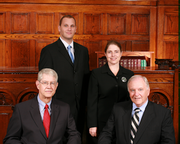4 Steps in the Civil Litigation Process

Legal disputes between people, businesses, and government entities arise every day. If the parties involved are unable to reach a settlement or agree on another way to resolve their differences, it often becomes necessary to take the matter to court. If you find yourself in such a situation, it’s helpful to know what you can expect as the legal proceedings unfold. This process—called civil litigation—involves several stages, and while each case is unique, they all follow the same basic steps. Here’s an outline of how these lawsuits work.
What to Expect From Civil Litigation Proceedings
1. Pleadings
The first phase is filing paperwork referred to as pleadings. These documents provide the key details about each party’s side of the dispute. The plaintiff files a complaint explaining the reason for the lawsuit and must have the defendant formally served with a copy. Once the complaint is received, the defendant has 30 days to file their answer, which can also include a counter-claim.
2. Discovery
 Discovery is the step where each side in the case is given a chance to gather information from one another that will be presented at the upcoming trial. This includes a list of witnesses and evidence. In turn, both parties can use what they obtain to prepare their arguments and avoid surprises. This step may also involve witness depositions, or sworn testimony a witness gives before the trial.
Discovery is the step where each side in the case is given a chance to gather information from one another that will be presented at the upcoming trial. This includes a list of witnesses and evidence. In turn, both parties can use what they obtain to prepare their arguments and avoid surprises. This step may also involve witness depositions, or sworn testimony a witness gives before the trial.
3. Trial
The next stage is trial, where attorneys for the plaintiff and defendant both have the opportunity to present their case to a judge and/or jury. Each side will introduce evidence in support of their arguments and may call witnesses to testify in court. Once the attorneys have concluded their case, they’ll give closing arguments as a summary of everything they presented during trial. Then the judge issues a ruling, or if there is a jury, they are given instructions and released to deliberate until they reach a verdict.
4. Appeal
In the event either party is unhappy with the results, an appeal can be filed. This means asking a higher court to review the case for errors that warrant the verdict to be overturned. Depending on its findings, the court will uphold the verdict, reverse the verdict, or order a new trial. Appeals can take several years to complete.
If you’re looking for quality representation in a civil litigation matter, reach out to The Law Offices of Bromm, Lindahl, Freeman-Caddy & Lausterer. Offering more than a century of experience, the firm has an established track record of success in the courtroom and will give your case the personalized attention it deserves. They understand the complexities of navigating a lawsuit and have been entrusted by countless Wahoo, NE residents to help fight for a favorable outcome. Call (402) 443-3225 to schedule a consultation, or visit them online to learn more about their services.
About the Business
(5 reviews)
Have a question? Ask the experts!
Send your question

